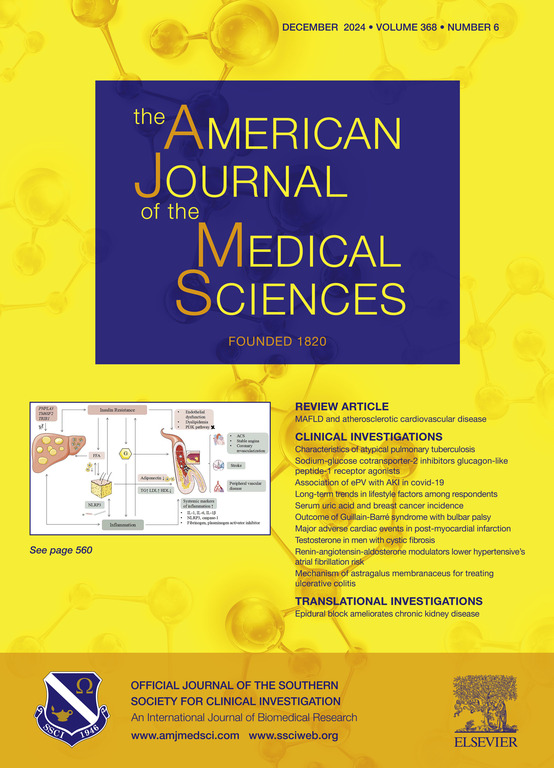改变治疗性生活方式对超重/肥胖和非酒精性脂肪肝患者的影响:随机对照试验。
IF 2.3
4区 医学
Q2 MEDICINE, GENERAL & INTERNAL
引用次数: 0
摘要
背景:非酒精性脂肪肝是一种在全球范围内日益增多的肝病。遗憾的是,目前尚无成功或经批准的药物治疗非酒精性脂肪肝的方法。因此,本研究旨在探讨改变生活方式对超重/肥胖和非酒精性脂肪肝患者的治疗效果:方法:进行了一项前瞻性、平行分组、随机对照试验。采用随机数字表将患者随机分为干预组和对照组。对照组提供为期 3 个月的常规健康指导,干预组提供多样化的生活方式干预。比较对照组和干预组在干预前后的身体成分、内脏脂肪面积、腹围和体重指数。数据分析采用了描述性统计、配对 t 检验和线性回归模型:共有 115 名参与者(干预组 57 人,对照组 58 人)完成了研究。干预组的高密度脂蛋白胆固醇水平、基础代谢率、肌肉质量和问卷评分均明显高于对照组(P < 0.05)。此外,干预参与者的体重指数、腹围、甘油三酯水平、低密度脂蛋白胆固醇水平和脂肪肝指数均低于对照组(P < 0.05):对超重/肥胖的非酒精性脂肪肝患者进行改变生活方式的治疗,可显著控制体重指数,改善血脂水平,降低脂肪肝和体脂率,改善基础代谢,缓解病情,提高生活质量。要确定治疗性生活方式改变对高危人群的长期影响,还需要进行更多的研究。本文章由计算机程序翻译,如有差异,请以英文原文为准。
Effect of therapeutic lifestyle changes on patients with overweight/obesity and non-alcoholic fatty liver disease: A randomized controlled trial
Background
Non-alcoholic fatty liver disease is a liver condition that is increasing globally. Unfortunately, there are no successful or approved pharmacological treatments for non-alcoholic fatty liver disease. Hence, this study aimed to investigate the effect of therapeutic lifestyle changes on patients with overweight/obesity and non-alcoholic fatty liver disease.
Methods
A prospective, parallel-group, randomized controlled trial was conducted. The patients were randomized into intervention and control groups using tables with random numbers. In the control group, routine health guidance was provided for 3 months, while in the intervention group, diversified lifestyle intervention was provided. The body composition, visceral fat area, abdominal circumference, and body mass index of the control and intervention groups were compared before and after the intervention. Descriptive statistics, paired t-tests, and linear regression models were used for data analysis.
Results
A total of 115 participants (57 in the intervention group and 58 in the control group) completed the study. The intervention groups had significantly greater high-density lipoprotein cholesterol levels, basal metabolic rate, muscle mass, and questionnaire scores than the control groups (P < 0.05). Furthermore, the intervention participants had lower body mass index, abdominal circumference, triglyceride levels, low-density lipoprotein cholesterol levels, and fatty liver index (P < 0.05).
Conclusions
Therapeutic lifestyle changes therapy for non-alcoholic fatty liver disease patients with overweight/obesity can significantly control body mass index, improve blood lipid levels, reduce fatty liver and body fat rates, improve basic metabolism, alleviate disease, and improve quality of life. More research is needed to determine the long-term impact of therapeutic lifestyle changes in high-risk groups.
求助全文
通过发布文献求助,成功后即可免费获取论文全文。
去求助
来源期刊
CiteScore
4.40
自引率
0.00%
发文量
303
审稿时长
1.5 months
期刊介绍:
The American Journal of The Medical Sciences (AJMS), founded in 1820, is the 2nd oldest medical journal in the United States. The AJMS is the official journal of the Southern Society for Clinical Investigation (SSCI). The SSCI is dedicated to the advancement of medical research and the exchange of knowledge, information and ideas. Its members are committed to mentoring future generations of medical investigators and promoting careers in academic medicine. The AJMS publishes, on a monthly basis, peer-reviewed articles in the field of internal medicine and its subspecialties, which include:
Original clinical and basic science investigations
Review articles
Online Images in the Medical Sciences
Special Features Include:
Patient-Centered Focused Reviews
History of Medicine
The Science of Medical Education.

 求助内容:
求助内容: 应助结果提醒方式:
应助结果提醒方式:


